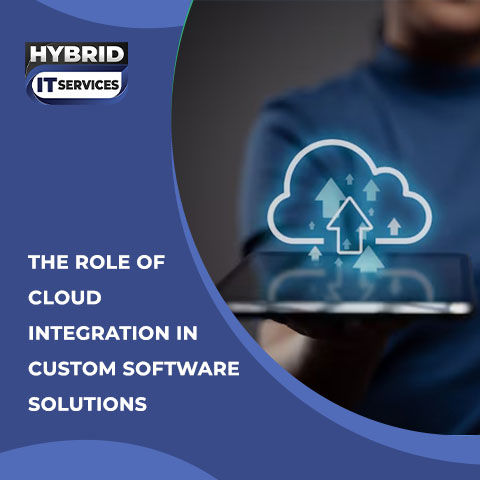Blockchain has progressed from being a buzzword to a pillar supporting revolutionary technology. From energizing cryptocurrencies to revamping how enterprises monitor transactions, blockchain is simply about safe and decentralized networks. But what drives all of that? The magic happens with blockchain protocols.
Just as traffic regulations prevent roads from becoming a melee, crypto protocols regulate how information is exchanged, verified, and stored on blockchain networks. A protocol, put simply, is a set of rules that each participant in the network adheres to. And if you're interested in how blockchain is being used in systems in the real world, getting familiar with key protocols is as good a starting point as any.
At Hybrid IT Let's break it all down without the jargon and take a look at five of the most significant blockchain protocols you should know about in 2025. Here you can see what is a crypto protocol?
What Is a Blockchain Protocol?
Before we dive into the top five, let's briefly discuss what a blockchain protocol is. A blockchain protocol establishes the rules for how data gets added to a blockchain, how nodes talk to one another, and how transactions get validated. It's like the DNA of a blockchain; it dictates everything from speed to security to functionality. These protocols are what enable blockchains to function without the need for a central authority, making them perfect to use in industries such as finance, healthcare, supply chain, and others.
Hyperledger
Hyperledger is not a single protocol; it's more of an umbrella project consisting of several frameworks and tools to facilitate enterprises embracing blockchain at scale. It's modular, can be customized, and is non-cryptocurrency-focused, making it interesting to sectors such as banking, manufacturing, and logistics.
One of its most prominent frameworks, Hyperledger Fabric, allows companies to build private, permissioned blockchains. That is, only approved players have access to the network, ideal for situations where privacy and confidentiality are essential.
Why it shines:
• Supports plug-and-play modules
• Best suited for business-to-business (B2B) solutions
• Supported by tech titans like IBM and Intel
If you're a company seeking to build secure, scalable applications with blockchain behind the scenes, Hyperledger is frequently the preferred choice.
You May Also Read: The Role of Blockchain in Custom Software Development
Ethereum (Enterprise Ethereum)
Ethereum is perhaps most famous as the platform for the cryptocurrency ETH, but it's so much more than that. It pioneered the idea of smart contracts, self-executing contracts programmed directly into the blockchain. Enterprise Ethereum uses the original open-source Ethereum platform and adapts it for commercial use. It enables businesses to create private versions of Ethereum that continue to leverage the powerful smart contract functionality and large developer base.
From decentralized finance (DeFi) to non-fungible tokens (NFTs), Ethereum has already transformed several industries. Enterprise Ethereum brings that same momentum to the business space.
Why it excels:
• Robust smart contract engine
• Large developer ecosystem
• Works on both public and private networks
Corda
Unlike most other blockchains, Corda does not use blocks or a linear chain of transactions. It's made to be lighter and more flexible, tailored to industries handling high-value or sensitive information, such as banking and insurance.
Corda enables direct peer-to-peer transactions, and information is shared only with the appropriate parties, not the entire network. Privacy and efficiency have been its key selling points, making Corda a darling among the financial industry. Corda demonstrates how blockchain concepts can be modified to meet the stringent requirements of industries where compliance and trust are paramount.
Why it's different:
• Not actually a blockchain, but a "distributed ledger"
• Privacy-oriented architecture
• Supported by more than 200 financial institutions
Quorum
Quorum is an enterprise-grade version of Ethereum that seeks to provide improved privacy and speed for financial institutions. It's permissioned, open-source, and built to meet regulatory requirements. By extending Ethereum's foundation, Quorum is still compatible with the Ethereum ecosystem but adds changes that enable high-speed private transactions between familiar parties.
If you're in finance or want to tokenize assets with very strong control over who gets to see what Quorum is worth exploring.
Why it excels:
• Permissioned network perfect for regulatory compliance
• Azure-based (with privacy enhancements)
• Tuned for high-throughput applications
Multichain
Multichain is a protocol that enables organizations to rapidly deploy private blockchains. What makes it especially attractive is how simple it is to fit into existing business systems and how highly customizable it is for different industry requirements. Multichain enables large-scale deployment and deep permissions management. And smart filters for validating transactions, all of which are important for business uses.
Multichain makes it simple for businesses to try out blockchain without the expense and hassle of building everything from the ground up.
Why it excels:
• typed API for high-speed development
• Easy implementation of permissioned blockchains
• Real-world asset and data exchange
Check out this related article: The Role of Quality Assurance in Custom Software Projects
Why Do Blockchain Protocols Matter?
Protocols establish the features, performance, and security of a blockchain. Picking the appropriate protocol is picking the proper base for a building; it determines what you construct above it.
Regardless of whether you're working on a crypto wallet, constructing a supply chain application, or designing a decentralized identity system, the protocol you choose will decide:
• Transaction velocity
• Scalability
• Security features
•Cost-effectiveness
• Privacy controls
In summary, these are the five blockchain protocols you need to know:
• Hyperledger—for enterprise-level private blockchains
• Ethereum (Enterprise)—for Dapps and smart contracts
• Corda—for secure, permissioned finance environments
• Quorum—for privacy-first Ethereum-based networks
• Multichain—for rapid, flexible, private blockchain deployment
Conclusion
Blockchain isn't do-it-yourself. What may be good for cryptocurrency may not be good enough for enterprise. And what works for finance may be too heavy-handed for logistics. That's where knowledge of the correct protocols comes into play. As blockchain technology grows, so too will these protocols. And new ones will be born. But until then, these five provide a good starting point for anyone wishing to examine the technology's real-world applications.






